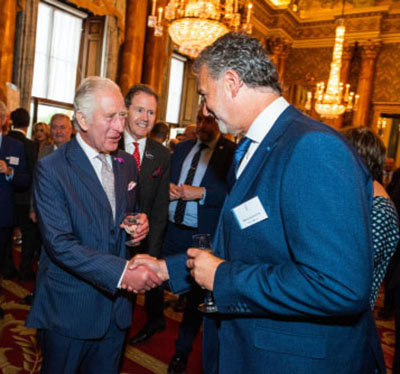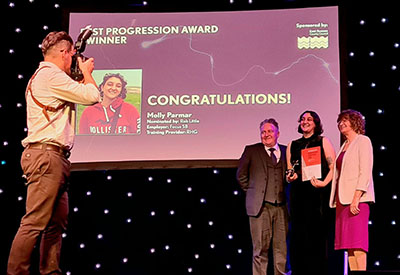Meet Make UK’s South of England Regional Director, Kerri-Anne Mruk
 Make UK’s South of England Regional Director, Kerri-Anne Mruk
Make UK’s South of England Regional Director, Kerri-Anne Mruk
Earlier this year Kerri-Anne Mruk celebrated two years at Make UK, The Manufacturers’ Organisation championing growth and innovation in British manufacturing and engineering, offering a powerful voice for manufacturers. Our PR Suzi Baker dives into what motivates Kerri-Anne in her role and explores how Make UK empowers its members to grow, giving them a voice to shape government strategy.
You recently said, “Innovation is oxygen.” How does the power of belonging influence your work at Make UK and drive change for its members?
Belonging is the foundation of progress. From my first day at Make UK, I felt deeply connected to our mission and members. This sense of belonging fuels collaboration, which is critical for innovation. When individuals and businesses feel valued and supported, they’re empowered to take risks, share ideas, and drive change. For our members, this translates into a collective voice that shapes policy, unlocks resources, and fosters partnerships. Innovation thrives when people know they’re part of a community that champions their growth, and that’s exactly what we’ve built at Make UK.
Focus SB is a longstanding member of Make UK (and of Made In Britain), which has given the company a voice at government level including last September’s Liberal Democrat Party Conference, a Manufacturing Commission pre-election event last July, and a smarter regulation roundtable at Whitehall last March. The company also boasts two Department for Business and Trade (DBT) Export Champions. How has this helped Make UK contribute to recent changes in industrial strategy?
Focus SB’s success, including its King’s Award for Enterprise in International Trade, exemplifies the impact of manufacturing on the UK economy. Their achievements, and those of our 20,000+ members, provide tangible evidence to shape government strategy. By amplifying these stories, we’ve advocated for policies that boost R&D investment, simplify export processes, and prioritise skills development. For instance, our recent industrial strategy report highlighted the £6 billion annual economic potential of closing the skills gap, a figure grounded in member insights. Focus SB’s global footprint reinforces the need for strategies that support SMEs in scaling internationally, something we’ll continue to push for.
Focus SB supports Make UK’s National Manufacturing Day with year-round events including factory tours here at St Leonards-on-Sea, careers fairs and its work as volunteer Enterprise Advisers and Careers East Sussex Industry Champions, working with local educators - including its first visit to a primary academy in June - to highlight the exciting and varied careers manufacturing offers. In your opinion, is the perception of manufacturing as ‘a dirty career’ changing?
Absolutely, but there’s more work to do. Initiatives like National Manufacturing Day, factory tours, and careers fairs are breaking stereotypes. When students meet apprentices coding smart factories or engineers designing sustainable solutions, they see a sector driven by creativity and cutting-edge tech. The rise of green manufacturing and digital tools like AI is reshaping perceptions. However, we must keep ‘creating ripples’, talking to schools, families, and communities about the diverse, fulfilling careers this industry offers.
In 2024 you arranged for Make UK’s Senior Economist Fhaheen Khan to visit Focus SB’s main factory in St Leonards-on-Sea.
Mr Khan commented: “Manufacturing in the UK is one of the most diverse sectors around, contributing over £200bn to our nation annually. National Manufacturing Day is about showcasing that value and how this industry excels in creativity and innovation, whilst providing high quality jobs that, for many, lasts a lifetime.”
This year Make UK’s ‘lost output potential’ of the sector was published in the government's industrial strategy report highlighting '49,000 total vacancies' because of serious skills shortages and estimating that 'solving the skills gap could contribute up to £6 billion a year to the UK economy’. What should the government do to address this?
Three priorities: First, expand funding for apprenticeships and vocational pathways, ensuring SMEs can participate. Second, embed industry partnerships in education. Third, launch a national campaign promoting manufacturing careers, targeting not just young people but career changers. The £6 billion opportunity we’ve identified is too significant to ignore.
If the skills gap isn’t addressed, what are the imminent issues according to Make UK’s membership?
Members believe unfilled vacancies (49,000 and counting) will stall production, delay innovation, and weaken UK competitiveness. Businesses will risk losing contracts to global rivals, and critical sectors like green energy or defence could face bottlenecks. For SMEs, this could mean stagnation or closure. The stakes are high, but so is the potential reward.
Do you think the government’s industrial strategy goes far enough to address these in practical terms?
It’s a starting point, but we need urgency and specificity. While the strategy acknowledges skills and innovation, policies must move faster. For example, tax incentives for upskilling workers or streamlined visa systems for technical roles could have immediate impact. We’re pushing for a ‘skills first’ approach in every policy decision.
Focus SB’s MD, Gary Stevens began his own career as a technical apprentice at 16. Are apprenticeships attracting more young people into manufacturing?
Yes, apprenticeships are increasingly seen as pathways to meaningful careers and it’s sharing stories like Focus SB’s MD, Gary Stevens, who began as an apprentice which inspire young people to see apprenticeships as gateways to leadership. However, we need targeted campaigns, employer partnerships, and parity between vocational/academic paths to sustain momentum and better promotion in schools with clearer routes for progression.
Make UK has been supporting companies from around the UK for 130 years, how has the landscape changed for the organisation?
From the Industrial Revolution to Industry 4.0, our role has evolved from advocacy to partnership. Today, we’re not just a voice for manufacturers but a connector, linking members to global markets, decarbonisation tools, and AI solutions. The challenges are more complex (geopolitical shifts, net-zero deadlines), but so are the opportunities.
Where do you see UK manufacturing on the world stage and why?
The UK manufacturing sector holds a distinctive, mid-tier global position as high value, innovation-driven specialists, excelling in aerospace (2nd largest exporter), pharmaceuticals, luxury automotive, and offshore wind (40% of global capacity). While renowned for R&D and niche craftsmanship, it faces challenges from post-Brexit trade friction, high energy costs, and large skills gaps, limiting its ability to scale like Germany or China.
To ascend, the UK must leverage green tech leadership (hydrogen, EVs), reshore critical supply chains (semiconductors, batteries), and pivot niche expertise into scalable advanced manufacturing. By focusing on sustainability, tech agility, and strategic trade partnerships, it can evolve into a top-tier advanced industrial hub, competing on ingenuity, not volume, despite geopolitical and economic head winds. We (UK) are most definitely leaders in sustainable innovation and our blend of heritage and agility positions us to pioneer green tech, advanced materials, and digital manufacturing. Collaboration between academia, government, and industry will keep us competitive!
What’s your priority for businesses in the South for 2025 and how might that differ from other parts of the UK?
Leveraging regional strengths in the sector – The South has a unique ecosystem of SMEs and research institutions, my focus is connecting them to funding, skills programs, and global supply chains. The region’s ability to balance a thriving sector with world-class manufacturing is extraordinary. Continued collaboration between government, academia and industry will ensure we remain globally competitive. Priority is scaling innovation while addressing local skills shortages.
Unlike other regions reliant on large corporates or single industries, our strength stems from collaboration, bridging cutting-edge academia with dynamic SMEs to scale breakthroughs in aerospace, pharma, and green technologies. While the Midlands focuses on EV gigafactories and the North on green energy transitions, the South will stand apart as a global beacon of high-value, research-driven manufacturing, where a craft brewery’s sustainability experiment sparks a materials innovation for a Bristol aerospace firm. This is how we’ll ensure the South remains competitive: by turning collaboration into global currency, and SMEs into global champions.
How do you like to spend your spare time?
Family is my anchor, my compass, and my greatest inspiration. I’ve been blessed with a childhood shaped by remarkable role models, people who instilled in me the values of openness, honesty, pride, respect, kindness, trust, and laughter. These principles aren’t just words; they’re the fabric of who I am, woven into every interaction I have, both at home and in the work I do.
My spare time revolves around nurturing those connections. Whether it’s hosting monthly breakfasts with my children, where we tackle challenges as a team, celebrate wins, and pass down the same values I was taught, or creating moments that bring loved ones together, family is where my heart resides. Those early mornings braving the rain for football training or cheering from rugby sidelines weren’t just about sport; they were lessons in showing up, discipline, and lifting one another up.
This foundation spills into everything. At work, I channel that familial ethos into being a connector, linking people, ideas, and opportunities with the same care I’d give my own kin. Collaboration, for me, isn’t transactional; it’s about understanding what ignites someone, honouring their strengths, and empowering them to thrive. Just as my family taught me, success isn’t measured individually, it’s collective.
So, whether I’m sharing marmalade at the breakfast table or advocating for manufacturers, it’s all rooted in one truth: Family isn’t just who you’re born to, it’s the legacy of kindness, trust, and shared purpose you build every day.
Final Thought:
Manufacturing isn’t just about products, it’s about people. Whether it’s an apprentice’s first weld or a firm’s first export deal, every step forward strengthens our collective future. Let’s keep building it together.
We echo these sentiments and thank Kerri-Anne for taking the time to contribute such an interesting and in-depth interview to Focus SB’s blog. Please visit Make UK to enquire about membership.







